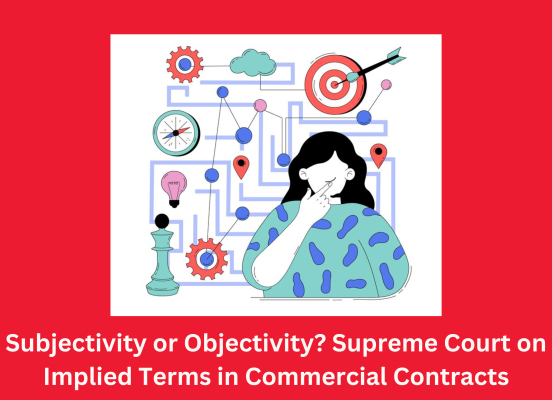
Subjectivity or Objectivity? Supreme Court on Implied Terms in Commercial Contracts
- By admin --
- Wednesday, 03 Apr, 2024
Regarding the resolution of unclear phrases in commercial contracts, this post aims to critically evaluate the recent case of Nabha Power Limited ("NPL") v. Punjab State Power Corporation Limited&Another ("PSPCL"). This decision is crucial because the court upheld a five-pronged test to eliminate uncertainties like this and give contracts vitality after thoroughly analyzing Indian and international jurisprudence regarding implied words in commercial contracts. It will now act as a guiding light for interpreting all business contracts.
When provisions in a contract are open to many interpretations, ambiguity occurs. Courts have frequently been faced with the task of interpreting contractual provisions drafted by parties that can be interpreted in multiple ways, given that contracts are essentially the product of the parties' will, enforceable by law, and subject to specific constraints. The objective theory and the subjective theory are the two guiding ideas that courts use when interpreting ambiguous contractual phrases.
In other words, the objective approach only considers the plain or literal meaning of the phrases, ignoring the parties' intentions when interpreting the confusing language. "Contracting parties must be made to understand that their written words, not their intentions as they attempt to express in the words, constitute their contract," is how it might be summed up. The contract was made by them, not by the court, and they selected the words. The interpretation the words convey to the court, not the meaning they intended to convey, is what determines whether or not it operates legally.
Conversely, the subjective theory advocates for interpreting contractual agreements by taking the parties' purpose into consideration. It is based on the idea that a contract cannot be formed without a consensus ad idem, or a meeting of the minds. In order to ascertain the parties' intentions under this rule, the courts mostly depend on parol evidence or the parties' pre-negotiation discussions.
In light of the aforementioned, the NPL case's factual matrix can be summed up as follows: The Punjab State Electricity Board (PSEB) invited competitive bids to choose a power plant developer in Punjab. Following the bid, M/s. L&T Power Development Ltd. ("L&T") was able to secure the contract and go on to purchase a 100% stake in NPL. Following that, NPL and PSPCL, the PSEB's successor company, signed a 25-year Power Purchase Agreement (the "Agreement") in which NPL agreed to supply PSPCL with coal.
The appellant claimed that the phrase "cost" encompassed the price of crushing, washing, handling, and shipping the coal. This was in response to a pre-bid clarification in which the respondents said that the winning bidder would be responsible for making the necessary arrangements to wash the coal. According to the appellant, the expenditures covered all expenses they paid up until the point of transportation to the project site. The real cost of moving the coal to the project and the real cost of unloading at the project site were mentioned when they invoked the reddendo singular singulisto concept.
Conversely, the respondents argued that the word "washing" was not used specifically in the contract and that a separate clause stating as much would have been necessary if the parties had meant for it to be covered by the costs. Additionally, they contended that the claims could not be included in the discharge costs until they fell under one of the three contract heads—purchase, transport, and unloading.
The defendants argued that the washing of the coal was not part of the buy cost and could have been done in a washery or by outsourcing to a third party in a dispute over whether the real cost or the purchase cost of the coal was to be charged. The only expense the plaintiff was required to submit was the purchase price that was paid to SECL in exchange for coal from the Korba/Rajgarh field.
The central question on the Court's agenda was whether the coal-washing expense may be inferred from the contract when calculating the appellant's ultimate costs. The Court maintained the five-pronged approach prior to terms being read into contracts after analyzing multiple decisions involving the idea of implied terms:
(1) Implied terms must be fair and reasonable;
(2) In order for a term to be implied if the contract is functional without it, it must be necessary to grant business efficacy to the agreement;
(3) The necessity must be so evident that "it goes without saying";
(4) It needs to be able to communicate clearly;
(5) It can't go against any of the contract's stated terms.
The appellant was required to "arrange" for the coal to be washed, the Court found, but the pre-bid explanation did not suggest that the appellant should bear the entire cost of the coal washing. It was decided that the contractual provisions were to be construed in a way that would be typically understood in the business sense, or, to put it another way, an objective standard of the same, while especially addressing the principle of "business efficacy."
Additionally, the Court concluded that the use of washed coal was a must in order to assess the quality of coal at the project site. As a result, all costs incurred up to that time were included, as no other coal could be utilized for the project save for washed coal. It was further decided that only terms incidental to the three main components of the formula—transportation, handling, and storage—could be included in the formula. In the process of applying this penta-principled test, the Court also decided that in the case that the express terms of the contract conflict with the plausibly inferred terms, the express terms would prevail.It's interesting to note that the Court maintained the parties' presumed aim as a peripheral criteria, ruling that courts shouldn't imply phrases that go counter to the parties' presumed intent.
When the Court is tasked with implying terms into a contract based on the aforementioned test, it is more likely to lean toward an objective stance of the same rather than a comprehensive intention-based guide. This can be observed by contrasting subjective and objective theories of dealing with ambiguities. This means that rather than considering parol evidence and other clearly stated intents of the parties, the literal or plain meaning criterion is given greater weight when determining the implications of terms in the contract.





